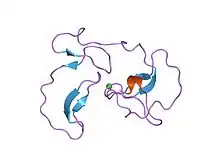Direct Xa inhibitor
Direct factor Xa inhibitors ('xabans') are a class of anticoagulant drugs which act directly upon factor X in the coagulation cascade, without using antithrombin as a mediator.[1]


Medical use
Direct factor Xa inhibitors are being used clinically. Clinical trials have shown promise for these compounds as substitutes for the currently administered vitamin K antagonists or low molecular weight heparin. Those trials demonstrated efficacy and safety against warfarin for stroke prevention in atrial fibrillation and against low-molecular-weight heparin for treatment and secondary prevention of venous thromboembolism or for initial treatment and prevention of venous thromboembolism in patients undergoing hip or knee replacement.[2]
Advantages of orally administered direct Xa inhibitors lie in the fact that they have a rapid onset and offset of action which reduces need for "bridging" with a parenteral anticoagulant, that they don't require frequent monitoring or re-dosing whilst having few strong drug interactions and no food interactions, leading to greater convenience by patients and doctors and that they have a lower risk of intra cranial bleeding in trials.
Disadvantages compared to warfarin include the currently limited prospective experience, concerns regarding patient adherence without laboratory monitoring, uncertainty about dosing in some patient populations (e.g., renal dysfunction, marked extremes of body weight), their contraindication in severe renal impairment, their lack of specific antidotes and assays to measure drug levels in case of severe bleeding, their potential to overuse in low risk atrial fibrillation people, their short half live affecting efficacy and their higher drug acquisition costs.[2]
Products
A new series of oral, direct-acting inhibitors of factor Xa have entered clinical development, and are competitors of dabigatran, which is a direct thrombin (factor IIa) inhibitor. These include rivaroxaban (Xarelto) from Bayer, apixaban (Eliquis) from Bristol-Myers Squibb, betrixaban from Portola Pharmaceuticals, darexaban (YM150) from Astellas, edoxaban (Lixiana) from Daiichi,[3] otamixaban by Sanofi, and more recently letaxaban (TAK-442) from Takeda and eribaxaban (PD0348292) from Pfizer.
The development of darexaban was discontinued in September 2011: in a trial for prevention of recurrences of myocardial infarction in top of dual anti platelet therapy, the drug didn't work and the risk for bleeding was increased by 300%.[4]
Antidotes
Andexanet alfa, a specific antidote to reverse the anticoagulant activity of direct Xa inhibitors in the event of major bleeding, was approved by the FDA in 2018. There is relatively limited clinical experience with the medication. There is also some limited evidence supporting use of non-specific prohemostatic therapies such as prothrombin complex concentrate [PCC], activated prothrombin complex concentrate [aPCC] and recombinant factor VIIa.
History
A naturally occurring inhibitor of factor Xa was first reported in 1971 by Spellman et al. from the dog hookworm. In 1987, Tuszynski et al. discovered antistasin, which was isolated from the extracts of Mexican leech, Haementeria officinalis. Soon after this, another naturally occurring inhibitor, tick anticoagulant peptide (TAP) was isolated from the extract of tick Ornithodoros moubata.[5]
References
- "Medscape.com". Retrieved 2009-01-23.
- Bauer, K. A. (6 December 2013). "Pros and cons of new oral anticoagulants". Hematology. 2013 (1): 464–70. doi:10.1182/asheducation-2013.1.464. PMID 24319220.
- Turpie, AG (Jan 2008). "New oral anticoagulants in atrial fibrillation". European Heart Journal. 29 (2): 155–65. doi:10.1093/eurheartj/ehm575. PMID 18096568.
- Grogan, Kevin (September 29, 2011). "Astellas pulls the plug on darexaban". Pharmatimes. Retrieved 11 April 2014.
- "P15358 antistasin". Uniprot. Retrieved 11 April 2014.
- Spellman, GG Jr.; Nossel, HL (1971). "Anticoagulant activity of dog hookworm". Am J Physiol. 222 (4): 922–27. doi:10.1152/ajplegacy.1971.220.4.922. PMID 5102508.
External links
- Direct Factor Xa Inhibitors as Anticoagulants | PharmaXChange.info – A review and presentation on the available factor Xa inhibitors which can be used as anticoagulants.
- Oral Xa inhibitors – Literature review of the evidence regarding oral Xa inhibitors
- http://ajplegacy.physiology.org/content/220/4/922.full-text.pdf+html